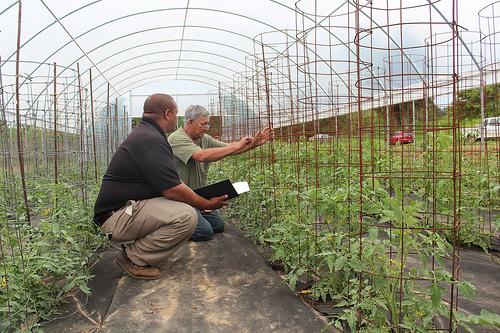
A polyethylene cover will be added to this frame to allow a seasonal high tunnel to do its job – provide a warmer climate for plants.
For years, Avon Standard has tilled the soil, planted the seeds and harvested the produce from his community garden with one purpose in mind—to feed people.
“My passion is to give and grow,” says Standard of the fruits and vegetables that he provides free to family, friends and the surrounding community. He recently took his efforts a step further. Read more »

NRCS Supervisory District Conservationist Kelvin Jackson helped tomato producer Danny Daniels expand his farm and make it more environmentally friendly.
For Danny Daniels, tomatoes take first place. He loves growing them so much, they’re the bulk of the produce raised on his Meridian, Miss. farm.
The retiree–turned–tomato guru started growing the fruit a few years ago. Tomatoes are finicky, and Daniels saw growing them successfully as a challenge. Read more »

The Stoltzfuses use high tunnels to lengthen the growing season for fresh fruits and vegetables. They built the first high tunnel on their own, and they liked it so much, they decided to build a second one with the help of NRCS.
For many farmers, the lessons of agriculture begin at a young age. This is true for Florence, Miss., farmer Kathy Stoltzfus, who says that her dad taught her what she knows when she was a child. She has fond memories of running barefoot through rice fields and the taste of freshly grown food. Read more »

Screenshot of the cover of the Know Your Farmer, Know Your Food Compass.
Are you a farmer, rancher or food business entrepreneur interested in local and regionally-produced food?
Are you a community leader wondering how local and regional food systems can help your local economy?
Are you a consumer interested in learning more about where your food comes from? Read more »

McGee shows members of the Women in Agriculture organization her seasonal tunnel house crops as well as other vegetables and herbs. The women were so impressed they said they wanted to grow everything she had.
Mary McGee’s late father could neither read nor write. But he knew how to farm.
He could farm so well, his daughter says, he had a PhD in making things grow. He taught her how to transform idle soil into lush farmland and to take care of animals. Read more »

Jill Bell and daughter Anna helping with the summer harvest for CSA shares.
Development can often benefit communities at the expense of agriculture; many of Utah’s farms are quickly being replaced by expanding residential, commercial and industrial development. Now many farmers and consumers have joined forces to increase the sustainability of agriculture in Utah with community supported agriculture, especially along the Wasatch Front. Community supported agriculture (CSA) is a way for consumers to directly invest in local farms and receive a regular delivery of fresh fruits, vegetables and other local products. Read more »






